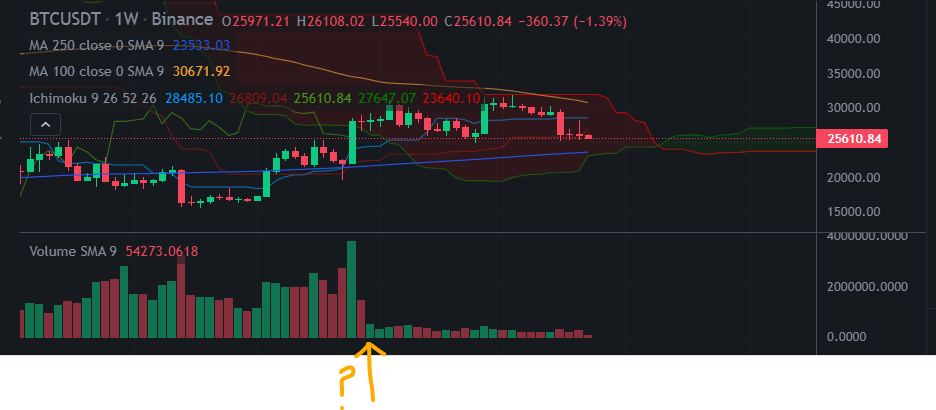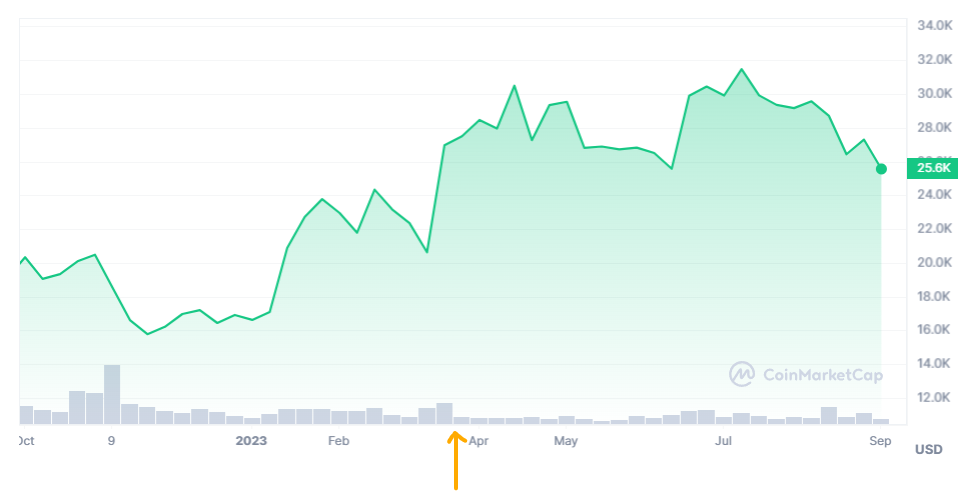Memory of a Bear
hive-167922·@tarazkp·
0.000 HBDMemory of a Bear
<div class="text-justify"> >***How long is a bears memory?*** A grizzly's memory is so sharp that he can remember where they encountered a certain food ten or more years earlier. And bears remember familiar animals for years, recognizing them and identifying their social status from a distance as far as 2,000 feet away. It helps that bears are creatures of detail. [source](https://www.pbs.org/wnet/nature/arctic-bears-bear-intelligence/779/#:~:text=A%20grizzly's%20memory%20is%20so,bears%20are%20creatures%20of%20detail.) My memory isn't that good. *I barely recognize colleagues I see near daily.*  Which is why I am wondering what happened at the end of March this year, because I was looking at the weekly chart on BTC/USDT on Binance and noticed the cliff drop on volume.   Coinmarketcap shows the same, with volume being cut approximately in half almost instantly. Even with rising prices of Bitcoin during that time, there is hardly a ripple, except in July when there was price movement from 25 to over 30 in a short period. But even that, didn't see a great deal of volume change. But, while I have no idea what happened there and there isn't much in the news that indicates why. There was the Silvergate Bank issue at that time, but that hasn't been in the news at all since. There are a lot of calls for BTC to end up around 21,000 before year's end. However, it also makes me wonder if that will happen, because at the end of the day, the markets do what the markets do and crypto tends to have a surprise or two in its movement at times. Perhaps it will be one of those "shaking the last of the loose hands" periods before driving the price. With the low volume then being indicative of the *hodlers hodling.* >As hodlers do. Whether it crashes or goes to the moon this year doesn't matter too much, as at least for me, it is more about the longer term future of crypto. For example, while talking to a colleague today at work and using crypto as an example (he is an enthusiast) of the adoption of technology and changing culture, the future is bright. I don't actually know if it will be Bitcoin or Ethereum or any of the current coins for sure, but one thing I am adamant about is that the global economy and the organization of money is going to change. It is inevitable. Because, culture is changing, people are changing their habits. As an illustration of this to my colleague, I asked him the main feature he uses on his phone, which was "chat" capabilities, as he *barely* calls anyone, or receives calls. So, why is it called a phone? It was only around the year 2000 that texting really became *a thing* in culture and then it exploded. Just think how crazy that sounds, when it takes longer to write a short message on a device that you can use to speak to that person directly. In twenty years from now, the oldest of the Gen-Zers are going to be in their mid-forties, and if they can get their ass into gear, they will be the ones making decisions in companies to drive consumption. These will be people who have only ever known digital living and digital wallets of some kind. They are people used to transferring funds from app to app and from peer to peer. And, they are people who will also be flush with inheritance from their grandparents dying. All those complaints about "boomers" now, will be what funds their future. How many will turn the money down? But, how they store and manage that wealth is going to be fundamentally different to how the boomers did it and the Gen-Xers they catered for with their innovations. The Gen-Xers came along and started innovating the tech to be more digital and then, the millennials will have taken it a step or so further in the next decade or so. But ultimately, everything changes, except the basic law of economics - *supply and demand.* The products, services and delivery methods change, the business doesn't. The monetization model of business can change though and in a digital world, we have shifted past the static world of Web 1 of dispersing information, through the participative Web 2 of creating and sharing of information and now, taking first steps into the decentralized ownership of information. The way businesses make money in each stage changes, where it has gone from dispersing information like a catalogue to sell products, to generate value directly through data collection, targeting and selling information, and soon on to the collection of value through the ownership of the information, which will give data ownership value. That is what we are on Hive - data owners. However, the way the markers of value transfer that value across the world has changed, from cash to digital transfer, from digital transfer to ad revenue models through clicks and then now, the decentralization of the digital markers themselves, so "money" itself becomes ownable information. That is essentially what crypto is, isn't it? You own the wallet, you own the keys, you own the transfer. >How and where you spend it, is up to you. This of course creates a whole range of challenges for the way we currently organize and govern our world, because it threatens the power of the decision makers. As they say, knowledge is power and the knowledge contained in money is now being distributed to the people en masse, so that no single entity can commandeer and use that power to control the masses. >And, another thing has changed and will continue to evolve - *memory.* Not just the memory that drives the technology, but the memory of information itself, which will become not only faster to store and retrieve, but also through the ability to record it "as is" in a moment in time and verify it at a point in the future, will mean that information will start to become far more precise, more trusted. Because rather than reliance on a central authority to tell us the truth, the information *we own* will be used to create a distributed web of trust to give us confidence in the information and its sources, which will become increasingly difficult to fake. The entire economy is going to be tipped on its head and in so doing, the entire governance structure is going to be heavily disrupted, and many will collapse, as they no longer meet the needs of the owners of information. So, they will build something that does. >It is the law of supply and demand. As we change, what we demand changes, and the supply will adjust accordingly. *Remember.* Bears are creatures of detail. Taraz [ Gen1: Hive ] </div> Posted Using [LeoFinance Alpha](https://leofinance.io/@tarazkp/memory-of-a-bear)
👍 kevinwong, afterglow, khalneox, mrwang, noloafing, nurhayati, smartvote, orthodoxnudism, bearjohn, jeffmackinnon, intishar, joeyarnoldvn, khalpal, subhari, retaliatorr, scooter77.pob, mvmoning2021, jkp.nisha, officialhisha, abh12345.pal, jontv, healthymary, cst90, tsurmb, babytarazkp, driptorchpress, rbm, nakary, yameen, bruleo, sumatranate.leo, coffeea.token, rmsadkri, rdfield, immanuel94, sumatranate, liaminit1, dbooster, steem.craft, warmstill, abh12345.archon, silversaver888, d-company, nichemarket, kat.eli, idea-make-rich, reggaejahm, mciszczon, tobago, cryptoandcoffee, ew-and-patterns, philnewton, g4fun, src3, iamfarhad, tipsybosphorus, xyz004, tamiapt6, mrsbozz, smasssh, dorkpower, reggaesteem, instytutfi, pero82, abh12345, drricksanchez, gaottantacinque, cribbio, borran, jayna, abitcoinskeptic, gasaeightyfive, misterengagement, isabel-vihu, mallorcamum, lestrange, joele, edwardstobia, thrasher666, abh12345.sports, blockbroccoli, jamesbrown, mikepm74, saboin.sports, revisesociology, goingbonkers, alexa.art, edb, ninnu, hugo1954, rituraz17, papilloncharity, fknmayhem, steemflow, phortun, asmr.tist, petrvl, hairyfairy, onlavu, helgalubevi, velinov86, jelly13, shanghaipreneur, yousafharoonkhan, reymoya95, belahejna, maajaanaa, pcojines, kendewitt, jemmanuel, votebetting, crookshanks, digital.mine, sbi10, camplife, freddbrito, codingdefined, ghazanfar.ali, superlao, hivebuilder, bozz, carlosp18, sbi-tokens, borniet, alexis555, chinito, thedailysneak, brutus22, moeenali, intrepidphotos, voxmortis, gerber, dcityrewards, ezzy, exyle, furious-one, fullcoverbetting, steem.leo, photosnap, mice-k, iikrypticsii, daan, felander, jongolson, unconditionalove, themightyvolcano, dlike, bastter, dpend.active, dcrops, gerardoguacaran, shitsignals, bestboom, bilpcoinbpc, frankk, rubencress, nateaguila, islanderman, kggymlife, triplea.bot, ribary, molometer, ericburgoyne, lackofcolor, yozen, cbridges573, simplifylife, blanchy, crowdwitness, alg-nftgaming, lizelle, denmarkguy, teamaustralia, erangvee, bigtom13, d0zer, shortsegments, debilog, lerma, stdd, excelsheets, erang, abdulmath, roberto58, por500bolos, gringo211985, mjmarquez4151, gloriaolar, rafaelgreen, sharmbabe, logic, itinerantph, freebornsociety, zulma, mytechtrail, zemiatin, yogacoach, piensocrates, mjvdc, fulcrumleader, wildarms65, oneray, josequintana, shebe, scholaris, kommienezuspadt, humoalex, ambar, onlycrypto, urri2020, yanes94, lowlightart, dune69, caladan, isotonic, followjohngalt, curatorcat, marcocasario, tiffin, mcsherriff, hive-defender, key-defender.shh, cryptoshotsdoom, tryskele, talentos, uwelang, janetedita, cryptoccshow, leprechaun, meesterboom, theluvbug, jaynie, krakatice, steemitbloggers, roleerob, abcor, patronpass, marketinggeek, celestal, skiptvads, jhelbich, tomiscurious, fatman, pepitagold, leomolina, cyclope, agustinaka, kurkumita, cconn, bobthebuilder2, nanzo-scoop, shanibeer, mummyimperfect, ak2020, emily-cook, t-bot, mafeeva, scoopstakes, nanzo-snaps, espoem, halukshananah, zuun.net, dimarmaca, wisbeech, leslierevales, ivet, ghua, penguinpablo, cryptonized, funnyman, alphacore, hungrybear, twicejoy, jacuzzi, joseda94, abrahan414, b00m, soyrosa, behiver, dalz1, citizensmith, cars-art, hivewatchers, abh12345.leo, meesterleo, medemr, abh12345.stem, slider2990, juecoree.stem, selftheist, storiesoferne, videoaddiction, jasonwaterfalls, sazbird, feanorgu, janitzearratia, lisset06, ericvancewalton, sillybilly, steemychicken1, privatblog, preparedwombat, meestemboom, valggav, emma-h, faniaviera, bagpuss, becca-mac, simplymike, organicgardener, noekie, battlemaster, naturalkiller, monsterdoom, bfciv, scoutroc, sommylove, nthtv, blind-spot, revise.leo, dashroom, not-a-bird, not-a-gamer, santigs, forexbrokr, danewilliams, crypto-guides, maryjane.main, morzex, softworld, chris-chris92, meowcurator, jmsansan, contapoupanca, themonetaryfew, brandonperez, riki1, amigoponc, devania, ahmetay, kirazay, bilgin70, flsfserkan, deadswitch, crazydaisy, edkarnie, jk6276, canadian-coconut, emma-h2, edicted, iansart, anonsteve, ileart, vcclothing, combination, louis88, jokinmenipieleen, owasco, galenkp, lanzjoseg, bilpcoin.pay, coinjoe, galenkp.aus, hive-168869, mrbonkers, agmoore2, insaneworks, justbabybee, ga38jem, luciannagy, gollumkp, springlining, outwars, chucho27, vxc.leo, celestegray, leo.tasks, scaredycatguide, niallon11, muratkbesiroglu, leo.voter, india-leo, bitrocker2020, swelker101, raiseup, syberia, netaterra.leo, leoschein, v10r8, elongate, banzafahra, jude9, saboin.leo, henrietta27, plicc8, inibless, specific-leo, neal.power, depressed.leo, globetrottergcc, gallerani, steemaction, aiuna, megavest, andrewmusic, zuly63, hive-world, grosh, leo.tokens, brando28, kushyzee, zeclipse, invest.country, leo.bank, creodas, bokica80, scrubs24, djrockx, grabapack, khaltok, jeffjagoe, arrliinn, ufv, warpedpoetic, steemxp, ireenchew, emeka4, cmplxty.leo, reonarudo, venarisyndicate, scraptrader, gadrian, getron, break-out-trader, flyingbolt, mukund123, coinlogic.online, x9ed1732b, onemoretea, amongus, aichel, njker, prosocialise, thoth442, abu78, divinekids, edian, davdiprossimo, bala-leo, vintherinvest, trafalgar, raindrop, traf, julesquirin, artefactoestudio, pouchon, sydechan, travelwritemoney, egistar, jimah1k, agro-dron, balvinder294, ragnarhewins90, el-dee-are-es, senorcoconut, abelfotografia, wiseagent, herbertholmes2, joelagbo, carolinawnn, daveks, artonmysleeve, pocketrocket, familyprotection, olaunlimited, rafzat, manniman, fieryfootprints, audiarmisg, ahmedhayat, eddieespino, victoradebiyiart, golden.future, jfang003, devpress, fw206, photographercr, boboman, cryptogee, thetroublenotes, jagged, vaynard86, harryhandsome, hbcpt, artlover, violator101, jphamer1, sharkthelion, fredrikaa, ikrahch, drag33, pablodare2, beeeee, ukulima, fengchao, bitcoinflood, hive-186141, valentin86, smallboost, hive-152804, archives-upfunds, raythulhu, thorkellnft, astrolabio, regenerette, rubelynmacion, rynow, ducecrypto, yann03, drax.leo, schindmaehre,